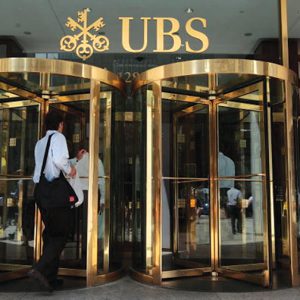Bloomberg
UBS Group AG increased its share buyback program and upgraded key profit and efficiency targets after rising capital market and trading revenues drove better-than-expected results at the investment bank.
Switzerland’s largest lender, which also beat analyst forecasts for profit and revenue, will buy back as much as $5 billion of shares this year, almost doubling its total buyback program, according to a statement on Tuesday. Amid rising costs for talent, the firm also set out new ambitions for its cost-to-income ratio and profit at its wealth management business.
Ralph Hamers, embarking on his second year as chief executive officer, is finally updating obsolete targets and giving investors more insight into his plans for the bank, after a move last month to revamp the digital offering by buying robo-advisor Wealthfront for $1.4 billion. His first full year passed with mainly cosmetic fixes after his strategic update last April received a lukewarm reception.
“We expect focus will be on the 2022 capital return plans, which are much better than consensus expectations,†Citigroup analyst Andrew Coombs wrote in a note to investors. He also said that the bank “appears to have gained market share in fixed income and equities in the quarter.â€
UBS soared in early Zurich trading, rising as much as 7.4% as of 9:08 am local time.
Even at a time when Hamers is trying to focus staff on future plans, the lender is still fighting a $2 billion tax penalty at the French supreme court and was hit by a $740 million fourth-quarter charge related to the case. The provision adds to the 450 million euros ($505 million) that the bank has already set aside to cover possible costs. A French appeal court in December ordered the bank to pay 1.8 billion euros in penalties after it upheld a 2019 finding that UBS illegally laundered funds by providing customers with services to hide assets from tax authorities.
In the third quarter, UBS’s return on CET1 capital was 20.8%, compared with a new target of 15-18%. The bank’s new cost-to-income ratio goal is for between 70% and 73%, compared with an earlier target of 75% to 78%.
The investment bank posted better-than-expected pre-tax profit of $713 million, buoyed by higher leveraged capital markets revenues and a 4% increase in equities.
The much smaller foreign exchange and credit business also gained, compared with declines at some peers.
The new targets give stakeholders a yardstick for the CEO’s digital ambitions and the push into a lower segment of wealthy clients, though the bank had already previously cleared some of the old goals by a clear margin. Some analysts may question the ambition of the new goals.
“For the second year in a row we achieved our targets, remained disciplined in our costs and saw strong contributions from all regions and divisions,†Hamers said in the statement. “Our updated targets focus on where we see the biggest opportunities.â€
Hamers’ first months in charge were cushioned by the unprecedented conditions of the pandemic, including soaring global wealth from rising stock market and property prices. The bank said in its outlook statement that it expects higher client activity in the first quarter, compared with the fourth, while economic and geopolitical concerns may affect asset prices.
About $657 million of the French tax provision was taken at the wealth management unit, impacting results at the business which saw a large increase in net new fee-generating assets. That business will pose a challenge to Hamers’ ambitions to keep a lid on costs: operating expenses increased by 25%, in part due to the litigation but also because of higher financial advisor variable compensation.
UBS provided some rational for its investment in Wealthfront and push into the so-called mass affluent segment. The global pool of revenues for clients with assets between $1 million and $5 million is expected to increase 47% between 2020 and 2025 and millennial’s wealth should grow 5 times faster than baby boomers. UBS says the acquisition lets the bank tap into those potential future revenues.
UBS and peers in Europe aren’t immune to the rising costs of attracting and retaining talent as the boom in dealmaking and demand for financial services ripples across Wall Street. Deutsche Bank CEO Christian Sewing said last week that he’s “very concerned†by the war for talent after compensation costs soared to the highest quarterly level in over two years.
UBS increased the amount of shares it plans to buy back to $7.6 billion, up from $4 billion. At the end of the fourth quarter, the bank had already repurchased $2.6 billion worth of shares. It also plans to boost its dividend. The bank expects a boost of $800 million in extra net interest income for full-year 2022 from interest rate hikes going forward.
 The Gulf Time Newspaper One of the finest business newspapers in the UAE brought to you by our professional writers and editors.
The Gulf Time Newspaper One of the finest business newspapers in the UAE brought to you by our professional writers and editors.
